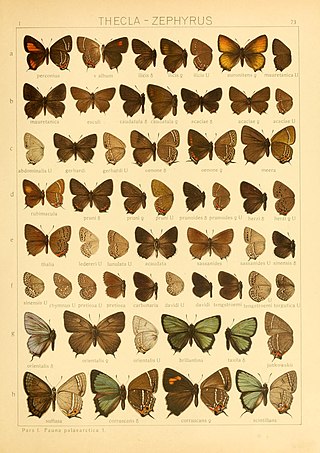
Satyrium ledereri, the orange banded hairstreak, is a butterfly in the family Lycaenidae.

Coenonympha oedippus, the false ringlet, is a species of butterfly in the subfamily Satyrinae. It is found in Austria, Belgium, the Netherlands, France, Hungary, Italy, Japan, Kazakhstan, Liechtenstein, Mongolia, Poland, Russia, Slovakia, Slovenia, Spain, Switzerland, and Ukraine. It is extirpated from Bulgaria, Germany, and Slovakia.

Lopinga achine, the woodland brown, is a Palearctic butterfly in the family Nymphalidae.

The Piedmont ringlet is a member of the family Nymphalidae. It is an Alpine butterfly.

The de Prunner's ringlet is a member of the subfamily Satyrinae of the family Nymphalidae.
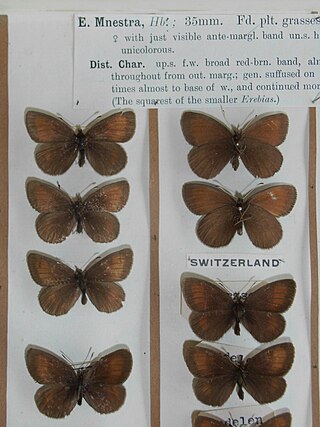
Mnestra's ringlet is a member of the subfamily Satyrinae of the family Nymphalidae. It is a mountain butterfly found in the Alps of Austria, France, Italy and Switzerland. The Mnestra's ringlet is named for Mnestra, a daughter of Erysichthon, king of Thessaly in Greek mythology.

Coenonympha hero, the scarce heath, is a butterfly species belonging to the family Nymphalidae.

Coenonympha glycerion, the chestnut heath, is a butterfly species belonging to the family Nymphalidae. It can be found in Eastern Europe and east across the Palearctic to Siberia and the Caucasus to North Korea.

Melanargia ines, the Spanish marbled white, is a butterfly species belonging to the family Nymphalidae. It can be found on the Iberian Peninsula and western North Africa.

Glaucopsyche melanops, the black-eyed blue, is a butterfly of the family Lycaenidae. It is found in the western part of Southern Europe and North Africa.
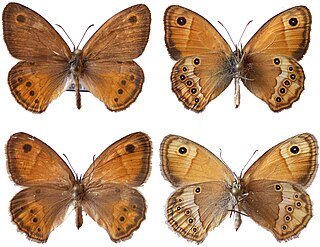
Coenonympha dorus, the dusky heath, is a butterfly of the family Nymphalidae. It is found in south-western Europe and North Africa.
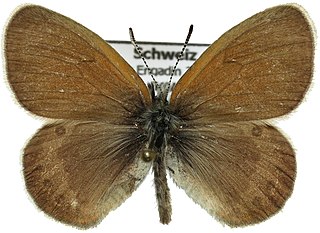
Coenonympha gardetta, the Alpine heath, is a butterfly species belonging to the family Nymphalidae. It can be in alpine meadows on heights of 800 to 2,900 from the Massif Central to Albania.
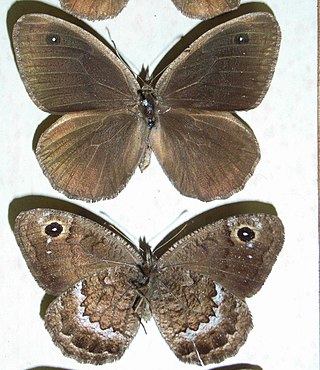
Satyrus actaea, the black satyr, is a butterfly of the family Nymphalidae. It is found in South-Western Europe, Asia Minor, Syria, Iran and Baluchistan.

Polyommatus (Plebicula) dorylas, the turquoise blue, is a butterfly of the family Lycaenidae. It is found in southern Europe, Asia Minor, the Ural Mountains, Caucasus and Transcaucasia. Its wingspan is 15–17 mm. The butterfly's common name comes from the dazzling bright blue colour of male's wings. The larvae feed on Anthyllis vulneraria. The butterfly flies from May to September in two generations. Habitats include flowery meadows in rocky areas at 500–2000 m.
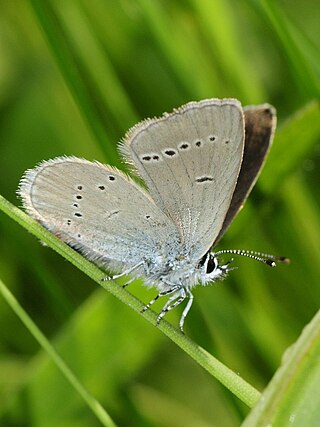
The Osiris blue is a butterfly in the family Lycaenidae. It is found in South Europe, Asia Minor, southern Siberia, the Alay Mountains, Tian-Shan, Dzhungarsky Alatau, the Altai Region, the Sayan Mountains, Lake Baikal and Mongolia. It is often confused with the small blue, a closely related species.

Triphysa nervosa is a butterfly of the family Nymphalidae. It is found in northern Transuralia, the mountains of southern Siberia, eastern Siberia, Amurland, the Russian Far East, Korea, northern and north-eastern China and Mongolia.
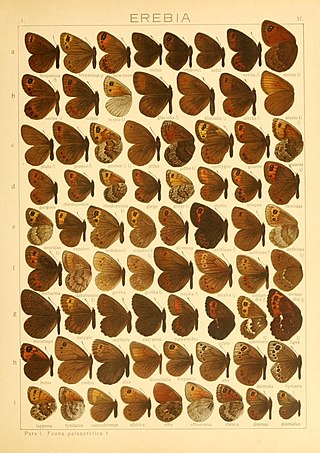
Erebia ottomana is a small butterfly found in the East Palearctic that belongs to the browns family.
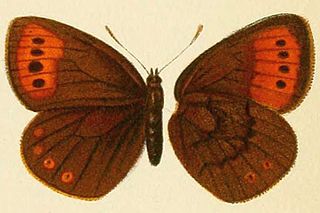
Erebia fletcheri is a butterfly found in the East Palearctic that belongs to the browns family. It resembles Erebia dabanensis but in fletcheri the reddish yellow borders of the ocelli of the forewing are merged on both sides to form a broad russet band. On the hindwing the small ocelli are widely separated from one another. The median band on the underside of the hindwing is dark and somewhat prominent in, while in fletcheri it is of the same dark brown colour as the rest of the wing, so that only the edges of this band are visible as two finely dentate black curved lines. It is found in July between Kurai and Bashkaus.

Patricius lucifer is a butterfly found in the East Palearctic that belongs to the blues family.
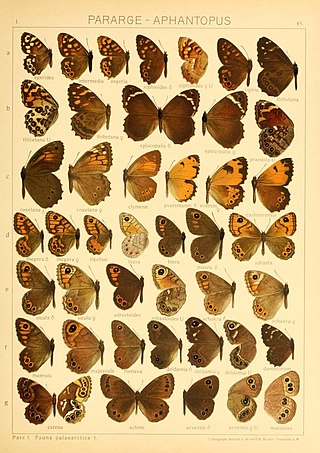
Aphantopus arvensis is a butterfly found in the Palearctic that belongs to the browns family. The species was first described by Charles Oberthur in 1876. It is endemic to western and central China.




















